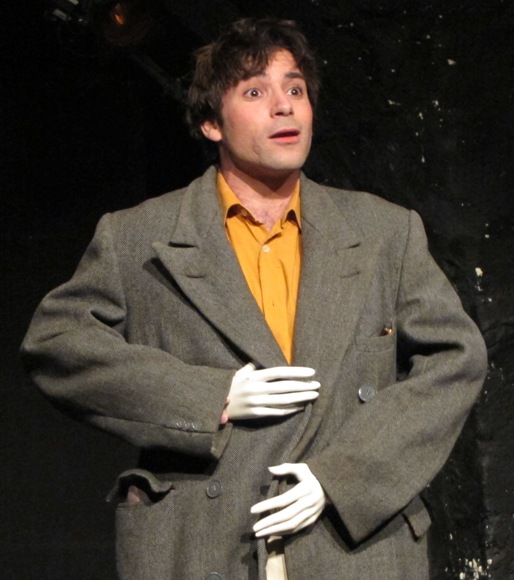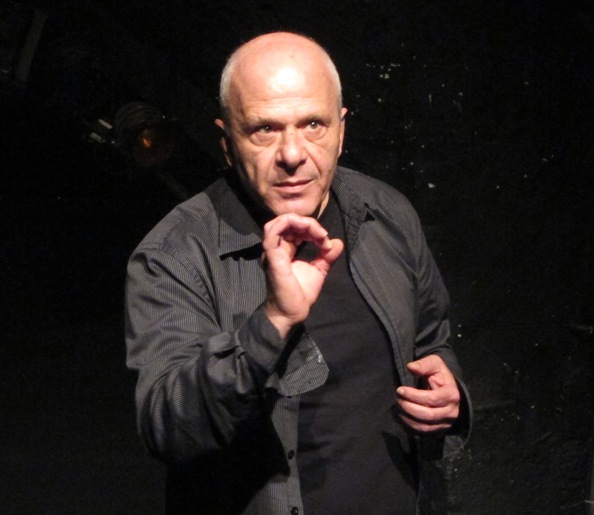Noam Rubinstein is a clown. Think Singing in the Rain – he’s the one who can do anything and get away with it. He’s a virtuoso performer, creating mesmerizing magic onstage. Every moment of his performance is enchanting, witty, wacky and insanely fun. Rubinstein was awarded the Theatronetto 2012 Prize for Best Actor for his performance in iDoll.

Written by Rubinstein and directed by Yuvalal Liron, with dramaturgical advice from Masha Nemirovsky, the premise of iDoll is simple and delightful: Pinocchio, long after his wish to become a “real” boy comes true, discovers that being a real grown up is not as much fun as it seems. Between caring for his aging father Geppetto, trying to make ends meet and coping with a problematic marriage, Pinocchio is also trying to build the ultimate doll. Rubinstein played both Pinocchio and the iDoll, with seamless transitions between the two and his iDoll was a work of virtual genius. Yet I felt that the narrative didn’t hold together as well as one might wish. Some elements were too random, and the conclusion felt somewhat hastily tacked on. The measure of Rubinstein’s talent is that I didn’t care, and would gladly watch the performance again. And again.
The festival as a whole was like a banquet table laden with such an abundance of flavors that it was impossible to taste them all. So it fell that I did not see the performance of the actress who received an honorable mention, Hila Metzger, nor did I see the children’s plays this year. Overall, the quality of the acting at the festival is a pleasure, the challenge of presenting a monodrama that stands alone as a work of theatre is more difficult to meet.
Leni Shafir wrote and performed Brilliant, the story of a loving relationship between a young woman and her grandmother, and the way it changes over time, as the two women grow older and change. Vibrant and full of warmth and movement, Shafir captures the essence of the relationship so well. Yet in trying to include and say everything, the work lost focus and therefore strength.
Several of the plays presented were adapted from literary texts; these had the advantage of relying on an existing narrative and structure. Emblematic is Daniela Michaeli’s outstanding reprisal in the guest performance Shlafshtunde (based on Yehudit Katzir’s novella), for which she won the Theatronetto prize in 1991, telling a tale of first love and loss of innocence from the dual perspective of a twelve year old girl and the adult woman she has become.

Hagit Ben-Ami Redler in an adaptation of a short story by Simone de Beauvoir delivered an intense, almost painfully honest portrayal of a woman who might not be “the best of mothers” but engages the sympathy of the audience nonetheless. Chantal Cohen was warm and endearing in an adaptation of Sara Shilo’s novel No Gnomes Will Come, as Simona, a widowed mother of six who, feeling that her life is over, waits in a soccer field in the middle of the night for a Katyusha rocket to fall and kill her. Cohen conveys not only the internal life of one woman, but the sense of a way of life and the culture of a community.

One of the most striking works and performances presented in the festival was Yossi Abu-Varda in Kafka’s Monkey by Colin Teevan, directed by Ilan Toren. A Haifa Theatre production based on Franz Kafka’s A Report to an Academy, translated and musically edited by Shimon Buzaglo, it is the story of an individual’s path on the “fast track” of evolution from ape to human in five years. Abu-Varda’s performance is full of charm and humor, with an engaging smile and a piercing gaze. Embodying the transition in his movements, he is a consummate entertainer – as is the protagonist he portrays.
Reporting to the academy, addressing the audience directly, he tells of his shooting and capture, and the strong desire for a way out of captivity. Not freedom, that is too much to even dream of, “what is freedom but an illusion that leads to disappointment.” The way out is to take on the behavior and culture of one’s captors. The price: the loss of memory.
The play has many humorous moments as Abu-Varda mimics the sailors aboard ship and the efforts his former ape-self made to imitate them. Yet a razor-sharp subtext cuts through this story of an individual forced to become what he hates, and in the process, forgetting and losing his identity.





